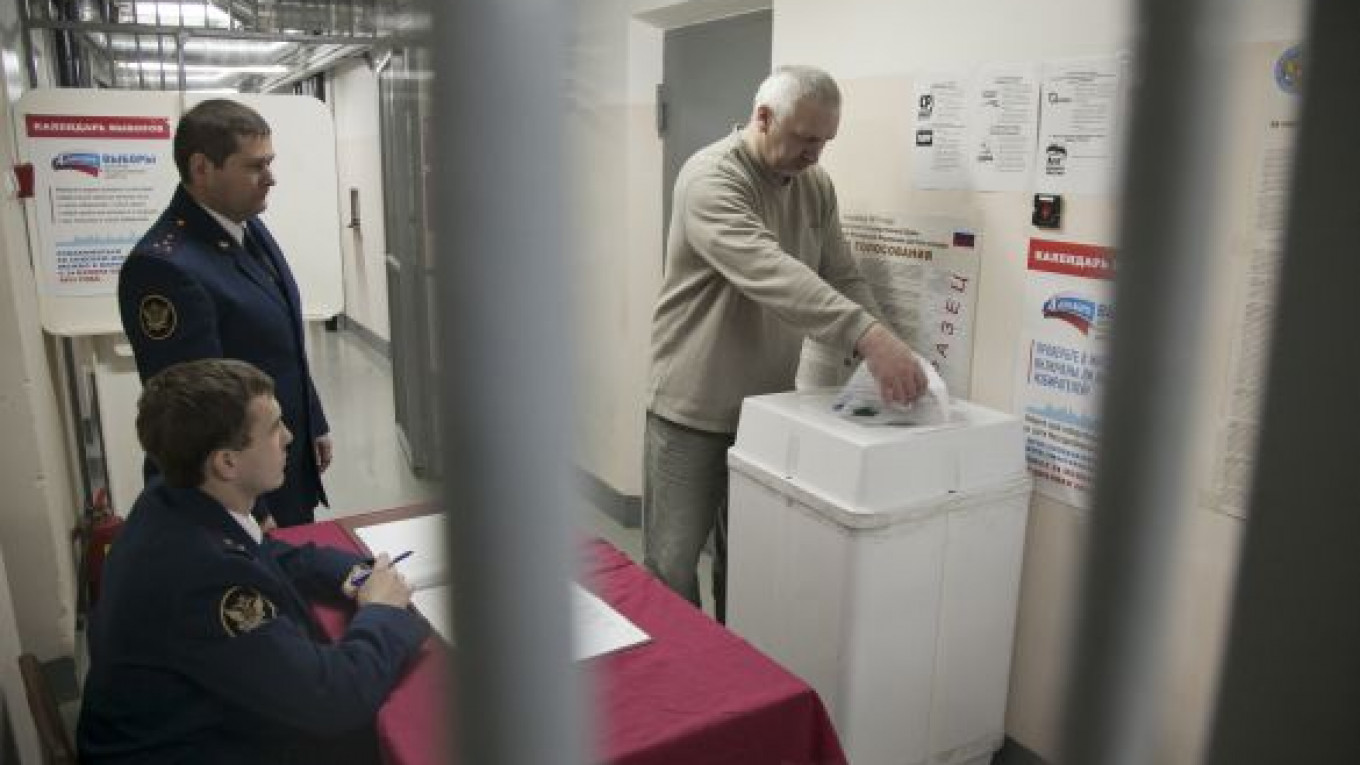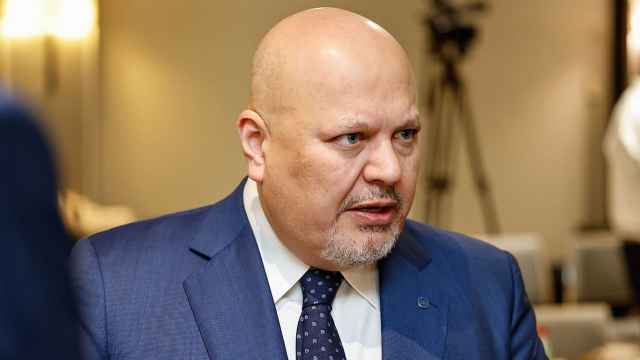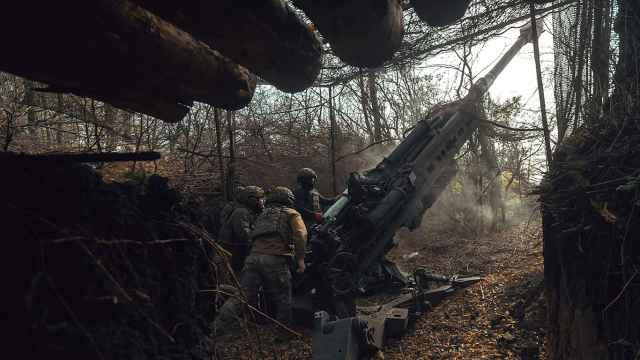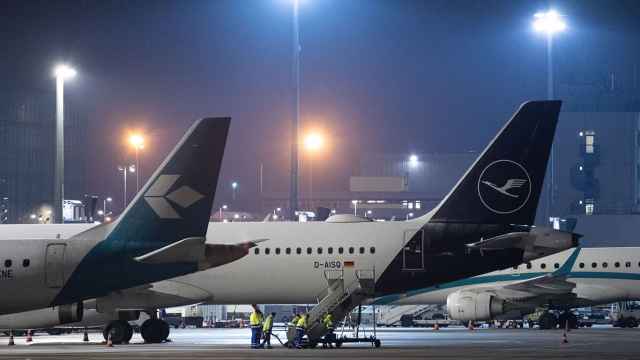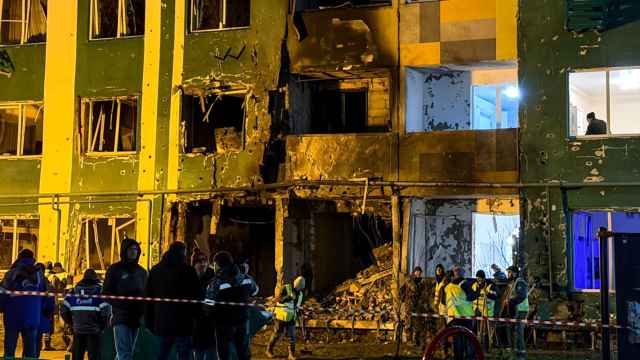They voted in a 2-by-4-meter cell, separated from the corridor by a door with steel bars. Two officials oversaw them get their ballots, tick their choice, and drop the paper into the box. Outside, a handful of journalists watched.
They were inmates at Matrosskaya Tishina, a Moscow pretrial prison that hosted a closed-door polling station for the State Duma elections Sunday.
The opposition has long complained that non-public polling stations — hundreds of which operate in prisons, hospitals, psychiatric facilities and army units nationwide — are a hotbed for voting violations.
Yet a tour of one of the facilities on elections day attracted little media attention. Only one cameraman, three photographers and seven reporters watched suspects vote at the Matrosskaya Tishina. A trip to Moscow's Alexeyev Psychiatric Hospital the same day attracted only one photographer besides a Moscow Times crew of two.
Convicted prisoners are banned from voting, but suspects in pretrial detention are not. People in psychiatric facilities are also allowed to participate in elections unless they are ruled legally incompetent.
Journalists were allowed to watch four detainees vote Sunday during a brief tour of Matrosskaya Tishina's polling station, organized by the Federal Prison Service.
The voters came into the cell through a side door, approached a prison official at a table to sign a book of records and get their ballots. They then disappeared inside the voter booth for about five seconds each and returned to drop the ballot into the box and exit through the same door.
The whole procedure took no more than three minutes per voter.
"LDPR!" one voter, a slim 20-something with dark hair and dressed in black, announced with a smile and his fist in the air when asked by journalist whom he voted for.
But another voter, a blond young man, hesitated and then answered with a confused smile and a shrug: "It's personal."
A total of 939 inmates and about 160 prison officials were to vote at Matrosskaya Tishina on Sunday, prison warden Fikret Tagiyev told journalists during the tour.
In 2007, the turnout for both groups was 100 percent, with no refusals to vote, he said.
His own choice is "naturally" United Russia, "the only party that can solve problems," Tagiyev said, holding up his face proudly as he spoke about the ruling party.
Two prison employees told journalists under the close watch of Sergei Tsygankov, a spokesman for the prison service's Moscow branch, that they also had voted for United Russia.
"I pin my hopes on United Russia," Vera Porshina, 20, said outside a polling station for prison officials, which was located in an ordinary room and not a cell.
"It will give us a road to the future," she said.
Porshina dismissed a suggestion that prison bosses had told her whom to vote for, saying there was "nothing of the kind" at their institution.
Viktor Shkerin, a senior official at the prison's utilities department, praised United Russia for being "the most stable organization" out there and said he trusted it because it is "headed by Putin and Medvedev."
Shkerin added that he hoped for a pay raise in 2013 "as promised by the government and the president."
Arkady Lyubaryov, an expert with the independent election watchdog Golos, said there are more opportunities for violations at closed polling stations, but United Russia actually scores a smaller percentage of the vote at prisons than at regular polling stations.
The Federal Prison Service, unlike regional authorities, is apparently not pressured into ensuring a good vote for United Russia, Lyubarev said. He added that the nationalist and populist Liberal Democratic Party, or LDPR, is a traditional favorite among voting inmates.
Elsewhere in Moscow, some 600 residents and 60 staff workers voted at Alexeyev Psychiatric Hospital, popularly known as "Kashchenko" after a Russian psychiatrist. The word has become a common noun for a psychiatric hospital and roughly means "bedlam."
Some patients and staff even got absentee ballots just to vote at the hospital, Andrei Synike, deputy physician-in-chief, told The Moscow Times.
"We called on them to cast their votes, to use their citizenship," Synike said. He added that the staff did not promote any party to their wards.
The residents were taken to the polling station in groups, accompanied by hospital staff. The Moscow Times watched a group of several females enter the voting booth one by one, mark a ballot and then stumble to the ballot boxes. A female staffer at the exit was waving to those who had cast their ballot with the words, "This way."
Synike did not allow The Moscow Times to interview the residents. "They might tell you something that turns out untrue," he said. Asked whether all able patients had voted earlier, he answered in the affirmative.
The doctor said he had already voted himself, using an absentee ballot. He did not name his choice, but said he was a longtime member of United Russia.
Rival A Just Russia was the only party monitoring all polling stations in Moscow on Sunday, Ilya Sviridov, acting secretary of the party's Moscow branch, said by telephone Wednesday. But The Moscow Times saw no party representative at either Matrosskaya Tishina or the Alexeyev hospital.
Monitoring prisons is an "optional" task for the Communist Party, which also dispatched observers to selected hospitals in the city, party official Alexander Potapov said.
Lyubarev, of Golos, said his organization was focusing its resources at open polling stations, where the voting was more representative of the country's mood in general.
Meanwhile, a steady trickle of regular voters braved inclement weather in Moscow to cast their ballots — although many did so with little enthusiasm.
"The youth tend to believe that the elections are pointless and everything is already decided," Natalya Kuznetsova, a pensioner, said as she left a polling station near the VDNKh metro station.
"I agree with them — voting is just a Soviet habit," she said. But she added that she has never skipped an election.
Several voters said they were backing parties they did not necessarily support because they could not bring themselves to vote for United Russia. Most of them declined to give their last names — a habit apparently shared, curiously, by United Russia's constituency.
One young man, who identified himself as Kirill, said he had voted Communist. "Not because I'm a Communist — I'm not — but because they've got the strongest chance of getting a decent-sized opposition vote," he said outside Polling Station No. 64 near downtown Tsvetnoi Bulvar.
"I voted for A Just Russia because I hope they will stand up to United Russia," Lyudmila said.
Still, many voters said they had thrown their support behind the ruling party.
"It's the only real political force in our country," said Maria as she left a polling station on Malokislovsky Pereulok. She avoided being more specific, adding only, "I like what they do."
"I like its program, and I don't agree with this idea that just getting rid of the current authorities is suddenly going to make everything better," said Oksana, one of the few United Russia supporters spotted at Polling Station No. 64.
Although a flurry of violations were reported by some media outlets Sunday, fraud was clearly not ubiquitous at polling stations visited by The Moscow Times. Observers from opposition parties posted to the polling station near the VDNKh metro said they had not detected any signs of foul play.
"Everything is going quietly, and we have yet to see any major violations," said Pyotr Kruglov, an observer for the Communist Party but not a member.
Not so lucky were the 100-plus non-Muscovites who were denied a chance to vote in the capital due to election officials who voiced confusion about proper bureaucratic procedures.
By default, voters are obliged to vote in the district of their official residence. Those who are on the move are supposed to apply for an absentee ballot, but they also can simply notify in advance the polling station of their choice that they want to vote there.
The procedure for notification, however, is not spelled out clearly. As a result, at least 100 voters whom elections officials across Moscow directed to Polling Station No. 152 at Nikitsky Pereulok, about 100 meters from the Red Square, were seen being denied ballots upon arrival.
The voters were first told that the polling station caters to people registered for residence outside Moscow, but it turned out that it was exclusively for those who have no residency permits at all.
"This is a station for the homeless," a policeman manning the polling station told The Moscow Times.
Dozens of the unlucky voters filed complaints with elections authorities. But they had already missed their chance to cast their ballots because the complaints will only be reviewed after the elections are over later this week.
Staff writers Roland Oliphant and Anatoly Medetsky and interns Justin Varilek and Rina Soloveitchik contributed to this report.
A Message from The Moscow Times:
Dear readers,
We are facing unprecedented challenges. Russia's Prosecutor General's Office has designated The Moscow Times as an "undesirable" organization, criminalizing our work and putting our staff at risk of prosecution. This follows our earlier unjust labeling as a "foreign agent."
These actions are direct attempts to silence independent journalism in Russia. The authorities claim our work "discredits the decisions of the Russian leadership." We see things differently: we strive to provide accurate, unbiased reporting on Russia.
We, the journalists of The Moscow Times, refuse to be silenced. But to continue our work, we need your help.
Your support, no matter how small, makes a world of difference. If you can, please support us monthly starting from just $2. It's quick to set up, and every contribution makes a significant impact.
By supporting The Moscow Times, you're defending open, independent journalism in the face of repression. Thank you for standing with us.
Remind me later.


